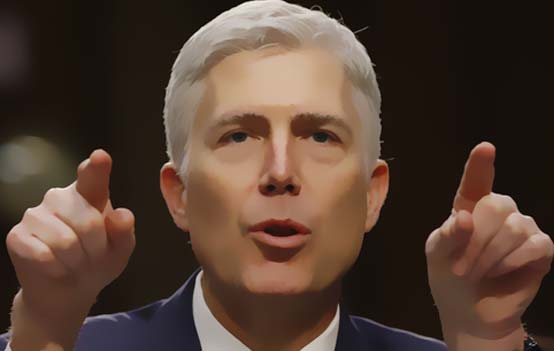
CAMBRIDGE, Mass. - With legal challenges to the Trump administration's initiatives multiplying in federal courts, new Supreme Court Justice Neil M. Gorsuch extolled the virtues of judicial independence and praised a legal system in which "government can lose in its own courts" Friday night.
It was the first public appearance off the bench for President Donald Trump's choice for the high court, who joined Justice Stephen G. Breyer at the Harvard Marshall Forum. Both are former Marshall scholars who did graduate work in the United Kingdom, and spoke at an event commemorating the 70th anniversary of George C. Marshall's plan to rebuild Europe after World War II.
The event was about as noncontroversial as it could be, even if one of the first questions to Gorsuch concerned a naked sex doll the future justice observed when he had tea with an Oxford dean.
Trump last week made good on his pledge to political opponents to "see you in the Supreme Court," asking the justices to revive his plan to temporarily ban entry to citizens of six mostly Muslim countries. A string of judges and appeals courts have concluded the president's executive orders have more to do with his campaign pledge to ban Muslims from entering the country than an immediate threat to the country's security.
Trump has bitterly denounced those rulings, as well as a decision to stop his proposal to cut federal funds from cities that protect illegal immigrants. During the campaign, he criticized a federal judge who ruled against him in a suit involving his for-profit universities because he said the judge's Mexican ancestry made him prejudiced.
Jeffrey Rosen, a legal scholar and writer who is also president of the National Constitution Center, did not ask Gorsuch and Breyer about those controversies or any matter before the court.
But Gorsuch and Breyer talked in broad terms about independence and respect for the judicial branch's decisions.
Gorsuch said he is grateful for the tradition that "judges can safely decide the law according to their conscience, without fear of reprisal."
It is a remarkable thing, he said, "that government can lose, in its own courts, and accept the judgment of those courts without an army to back up the judgments. Just nine old people in polyester black robes that we have to buy at the uniform supply store. . .that is a heritage that is very special."
As he did at his confirmation hearing, Gorsuch downplayed divisive decisions and stressed unanimity and acceptance of court's decisions. Only about 5 percent of cases are appealed, he said, and "our court" accepts only 80 or so a year, a relative handful.
"Nine justices appointed by six presidents over a 30-year period," Gorsuch said. "And we're unanimous about 40 percent of the time."
Of course, it is the closely divided cases at the appeals courts and the Supreme Court that are its most important. But Gorsuch and Breyer stressed the independence judges have to make controversial decisions.
"Travel elsewhere. See how judges live," Gorsuch said. "See whether they feel free to express themselves. See how free you feel to express yourself. It is a blessing and remarkable heritage and we owe a good chunk of it to our forefathers and theirs in England."
As he has in the past, Breyer mentioned how political leaders and Americans accepted the court's decision in Bush v. Gore, even though at least half of the country disagreed with the outcome that stopped counting the presidential vote in Florida and confirmed the presidency for George W. Bush.
"It was wrong in my opinion, OK, but people followed it," said Breyer, who was on the short end of the 5-to-4 decision. "They did not go out and throw stones or shoot other people."
Breyer and Gorsuch spoke to about 200 people in the atrium of the Harvard Art Museums, under the massive Triangle Constellation, a mobile by Mexican-born artist Carlos Amorales. About 150 of those were Marshall Scholars, who studied in England through a scholarship program established by Parliament in appreciation for the Marshall Plan.
The Marshall Scholars are slightly less known than another prestigious group, the Rhodes Scholars, so Rosen, himself a Marshall Scholar, could not help but point out to Breyer ('59) and Gorsuch ('92) which group was represented among the justices.
"How many Rhodes Scholars are on the Supreme Court?" he asked as the crowd laughed. "Oh, there are none?"
Gorsuch received a doctorate in philosophy from Oxford, and worked on a thesis critical of euthanasia and assisted suicide that became the basis for a book. But more importantly, he said, he met his wife, Louise, while there. His mother-in-law still refers to her as a "war bride," Gorsuch said.
But his most unusual memory was the time he was invited to tea by the dean. Gorsuch said he became aware of a figure in the corner, and determined it was a sex doll, wearing only a boa. This did not seem to unduly surprise the crowd.
The dean explained that in times of quandary, "Sandy" could be counted on for answers.
"Did Sandy supply the answers?" Rosen asked, to laughter.
Gorsuch paused a beat. "Not to me," he answered


 Contact The Editor
Contact The Editor
 Articles By This Author
Articles By This Author